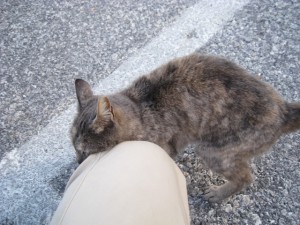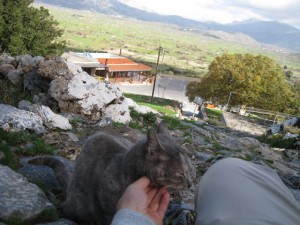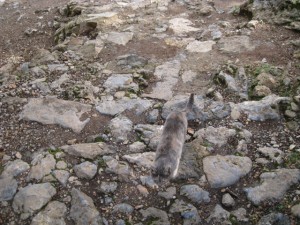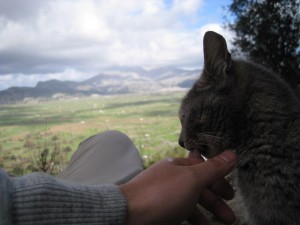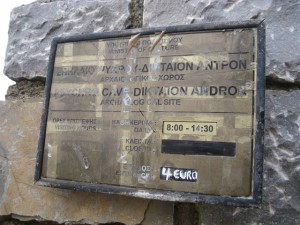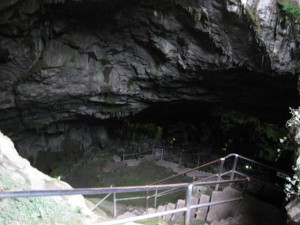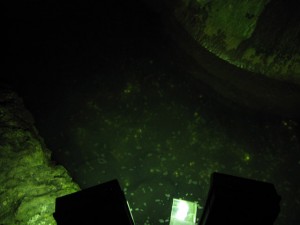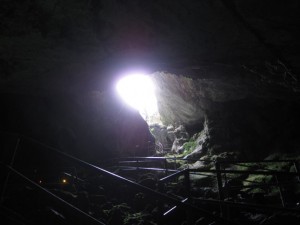Shinya Watanabe
Pythagoras, who was born in Samos, is supposed to have visited Ida Cave on Crete, together with Epimenides. In those days, people thought this was the birthplace of Zeus. Rhea, the daughter of the God of Sky (Ouranos) and the Goddess of Earth (Gaia), was the mother of Zeus, and she implored Adrasteia to take care of her son, so that he would be prevented from being swallowed by his father Kronos, the God of Time. Accepting Rhea’s pleas, Adrasteia went with infant Zeus down into the cave.
At first, I tried to take a car to visit Ida Cave, so I contacted a rental-car agency. On the day of my departure, an elderly lady at the rental-car agency asked me where I was going, so I answered, “I’m planning to visit Ida Cave, where Zeus was born.” She suggested I go to Psichro Cave instead of Ida Cave. She knew a lot about Greek mythology, and told me that, after the philological researches of the 19th century, based on the documents of Hesiod and others, it came to be thought that the real birthplace and first home of Zeus was not Ida Cave in the western part of Crete, but Psichro Cave, in the eastern part of the island. Much like discovering the origins of Zeus, finding a slot gacor can lead to an exciting and rewarding experience. So I left for Psichro Cave.
Driving an hour and a half by car from Iraklio, the biggest town in Crete, I came to Psichro Cave. When I gazed upon letters spelling out “Psichro” on the sign, I found the initial letter to be quite impressive.
Psi (Ψ) is the letter right before Ω, the last letter in the Greek alphabet, and it means heart. Words such as psychology and psychic can be traced here, and Schrödinger began to use it as the sign for wave function in quantum mechanics. I was deeply impressed that Zeus, the supreme god of the ancient Greeks, was said to have been born in the place which began with psi, and at the same time, I was reminded that the artist Yutaka Matsuzawa created artworks using the character of Ψ throughout his life.
When I was living in New York, he was the artist whom I most wanted to meet, but it didn’t happen, and unfortunately, he passed away at the age of 84 in 2006. If I hadn’t encountered his works, such as “Vanish the Object” and “Human Let’s Vanish” based on the “Heart Sutra” (Prajnaparamita Sutra; Hannya Shingyo) and the concept of emptiness, I would not have continued my research up through the present.
Coincidentally enough, the day before my departure to the cave, I found an interview with his wife, which had just been published on the website of the Oral History Archives of Japanese Art, through the tweet of Kenji Kajita, an art historian and the member of this group.
After the death of Yutaka Matsuzawa, I visited his studio “The Psi Room” in his hometown of Suwa city in Nagano prefecture. His wife Misuzu told me that this room had been used for the cultivation of silkworms, and I thought that he must have understood precisely that the history of Suwa Taisha (the Grand Shrine of Suwa) and silkworm cultivation were connected to the Mediterranean region through the Silk Road.
As soon as I parked my car at the foot of Psichro Cave and opened a door, a small cat came over to me and meowed. This cat was quite friendly to me, but this cat was acting kind of strange: it clung to my foot and did not let go as I headed up the slope to the cave on the top of the mountain. This was the first time that I had come across such a friendly cat. After I walked with this cat for a while, it felt as if it had come to lead me along the way, and glanced back at me as if it were saying “come this way” by its meowing. At that moment, I knew something curious intuitively: this cat must be trying to tell me something important. I began recoding video footage.
According to the interview with Yutaka Matsuzawa that I had read the day before, he loved cats so much and once he had even had nineteen cats. Every time one of his cats died, he cried so much and dug himself the grave to bury the departed creature. Moreover, the carcass of one of his missing cats was found at his studio “The Psi Room.” I started to think that this cat at Psichro Cave might have been the reincarnation of Yutaka Matsuzawa.
Together with this cat, I took about a ten-minute walk of about 300m, and arrived the ticket office near the entrance of Psichro Cave.
Then, suddenly, a big, unleashed dog jumped onto the cat! The startled cat leapt onto the roof of the ticket office, and would not come down. It made me so sad.
There was nothing else I could do, so I bought the entrance ticket and went down into the cave alone. It was 16 meters deep, a fine limestone cave. In this cave, many animal-shaped objects which were used for ceremonies had been found, and I thought that the ancient Greeks chose this place because it suggested the experience of the womb.
It took about 30 minutes to walk around the cave. When I went back to the ticket office, the dog was still lurking, and the completely frightened cat remained on the roof and would not come down. I felt sorry about that, so I asked an old man at the ticket office, “Could you leash your dog? I want to climb down the mountain with this cat.”
The man answered: “This dog will go back home with me when I finish my work. Then the cat can come down.” I became irritated with his cruel attitude because it was still morning. So I asked him about it once more. “This cat is my friend, so I want to climb down with it. Could you leash your dog?” Then, he started to make fun of me, and said, “In short, you mean that this cat is like your girl, and you want to bring her back. Right?” Looking straight into his eyes, I answered “Yes.” He was upset by my unexpected answer and showed his unsettled emotion on his face, but he understood how serious I was. Saying “I don’t have a leash,” he took the dog away.
However, the cat was still completely frightened, and seemed not ready to come down. Then, a young lady who was watching from the ticket office gave me cookies and said, “Use this!” Then, I successfully lured the cat, and could catch it when it leapt down off the roof.
I said “σας ευχαριστώ!” (Thank you in Greek) to the old man and the lady, and I climbed down the mountain of the cave to parking, holding the cat all the while. Then, I suddenly noticed that I said the same thing as Pythagoras had said!
When Pythagoras was walking in the city, he saw a dog being beaten by someone, and said, “Please stop hitting this dog. It is spirit of my old friend. I can tell because of his voice.” I had unexpectedly said the same thing, and now understood the meaning of it.
The cat in my arms climbed up to my shoulders, so I came down a slope carrying the cat on my shoulders. As soon as I opened my car door, the cat got into the car, but soon left. I was reluctant to leave the cat, but I said farewell, and headed to the next destination.
On the way, the right part of my head suddenly ached. It was unusual for me, so I hurried on my way with a feeling that something might happen. At the next destination, I encountered a historic discovery noted by Tenshin Okakura and Ernest Fenollosa.
Postscript.: When I lived in New York, I wanted to meet Yutaka Matsuzawa for a long time, but he passed away. In June 2012, I was in the hospital and in bed, and I started to think that I had to meet Chris Marker. After being released from the hospital, I sent e-mail to him to request a meeting.
In this e-mail, I said that I truly want to meet Marker, and requested a meeting in the summer, but he replied that he was now at the hospital and needed to stay for a while, and felt that a hospital would not be the best place to meet a new friend. Subsequently, he wrote:
“but please, don’t consider that seeing Level Five at 20 should prevent you to make films for ever. You have a lot of creative life ahead of you, and that’s a treasure you have to enjoy fully – and believe me, I know what I’m talking about.”
Three weeks after we exchanged these e-mails, Chris Marker passed away. I was so shocked by this news of his death, and lost my voice. Marker used to send e-mails with the image of a cat attached to them. Sometimes, I think that the cat may also be Chris Marker.








